|
|
|
Sort Order |
|
|
|
Items / Page
|
|
|
|
|
|
|
| Srl | Item |
| 1 |
ID:
162455
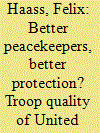

|
|
|
|
|
| Summary/Abstract |
Why do similarly sized peacekeeping missions vary in their effectiveness to protect civilians in conflicts? We argue that peace operations with a large share of troops from countries with high-quality militaries are better able to deter violence from state and non-state actors and create buffer zones within conflict areas, can better reach remote locations, and have superior capabilities – including diplomatic pressure by troop contributing countries – to monitor the implementation of peace agreements. These operational advantages enable them to better protect civilians. Combining data from military expenditures of troop contributing countries together with monthly data on the composition of peace operations, we create a proxy indicator for the average troop quality of UN PKOs. Statistical evidence from an extended sample of conflicts in Africa and Asia between 1991 and 2010 supports our argument.
|
|
|
|
|
|
|
|
|
|
|
|
|
|
|
|
| 2 |
ID:
187388
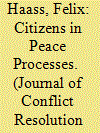

|
|
|
|
|
| Summary/Abstract |
Citizen engagement in and support for peace processes have been deemed important for sustainable peace after civil wars. Yet much of what we know about peace processes in civil wars centers on the interests of elite actors. This special feature aims to advance a research agenda focusing on citizens in peace processes to address this mismatch. In the introduction to the special feature, we first present empirical evidence situating citizens in relation to civil war peace processes. We then trace the current state of the literature on the roles of citizens in peace processes. Following that, we introduce a conceptual framework designed to improve scholarly analysis of the political behavior of citizens in peace processes. We also locate the individual contributions to the special feature within the framework in order to demonstrate its utility and as a means of helping to identify directions for future research.
|
|
|
|
|
|
|
|
|
|
|
|
|
|
|
|
| 3 |
ID:
117939
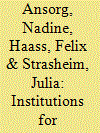

|
|
|
|
|
| Publication |
2013.
|
| Summary/Abstract |
IN DIVIDED SOCIETIES, CHARACTERIZED BY AN ANTAGONISTIC SEGMENTATION
among identity groups, formal state institutions are of paramount importance in regulating intergroup conflict. Institutional reform is thus an
appealing option to shape such state institutions-the system of government, electoral systems and party regulations, territorial state structure, the
judiciary, and the security sector-in order to promote sustainable peace
and prevent the occurrence or recurrence of violent conflict. However,
research is far from having arrived at a consensus about what institutions
work where and how. Is the choice of institutional design in a postwar situation determined at all by expected political utility? What distinguishable
effects can different designs have under what conditions? How do institutions interact-what role does the "concert of institutions" play in the
impact on sustainable peace?
|
|
|
|
|
|
|
|
|
|
|
|
|
|
|
|
| 4 |
ID:
181196
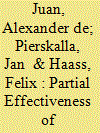

|
|
|
|
|
| Summary/Abstract |
Dictators depend on a committed bureaucracy to implement their policy preferences. But how do they induce loyalty and effort within their civil service? The authors study indoctrination through forced military service as a cost-effective strategy for achieving this goal. Conscription allows the regime to expose recruits, including future civil servants, to intense “political training” in a controlled environment, which should improve system engagement. To test this hypothesis, the authors analyze archival data on over 370,000 cadres from the former German Democratic Republic. Exploiting the introduction of mandatory service in the GDR in 1962 for causal identification, they find a positive effect of conscription on bureaucrats’ system engagement. Additional analyses indicate that this effect likely did not result from deep norm internalization. Findings are more compatible with the idea that political training familiarized recruits with elite preferences, allowing them to behave strategically in accordance with the rules of the game.
|
|
|
|
|
|
|
|
|
|
|
|
|
|
|
|
| 5 |
ID:
146929
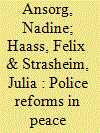

|
|
|
|
|
| Summary/Abstract |
This article presents new data on provisions for police reform in peace agreements (PRPA) between 1975 and 2011. The PRPA dataset complements past research on the determinants and effects of specific terms in agreements with detailed data on police reform provisions. The PRPA dataset also adds a quantitative dimension to the thus far largely qualitative literature on post-conflict security sector reform (SSR). It includes information on six subtypes of police reform: capacity, training, human rights standards, accountability, force composition and international training and monitoring. We show that there is currently a high global demand for the regulation of police reform through peace agreements: police reform provisions are now more regularly included in agreements than settlement terms that call for power-sharing or elections. We observe interesting variations in the inclusion of police reform provisions in relation to past human rights violations, regime type, or the scope of international peacekeeping prior to negotiations, and illustrate the implications of police reform provisions for the duration of post-conflict peace. Finally, we stimulate ideas on how scholars and policymakers can use the PRPA dataset in future to study new questions on post-conflict police reform.
|
|
|
|
|
|
|
|
|
|
|
|
|
|
|
|
|
|
|
|
|